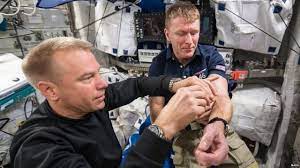
Scientists have got information about why astronauts become anemic after returning from space, that is, why they lose blood.
Canadian researchers say that 50 percent of the body's red blood cells are destroyed in space, and this happens until the mission goes on.
He said that due to this, it is a big challenge to make space trips to the moon, Mars, or far away.
But, their discovery can benefit patients suffering from similar diseases on Earth.
Scientists have known about the loss of blood in space, ie 'Space Anemia', from the time of the first mission to return to Earth from space. But why this happens, till now it remained a mystery.
Cells destroyed throughout the mission
In a study conducted on 14 astronauts, researchers from the University of Ottawa have got more information about this. Among the astronauts involved in the study was Britain's Tim Peck, who has spent six months on the International Space Station researching a variety of topics in space.
During this mission, samples of the astronauts' blood and breath were taken so that researchers could measure the number of red blood cells in their bodies.
These cells carry oxygen from the lungs throughout the body and are vital for life.
"In this study, we found that more blood cells are being destroyed upon reaching space, and this has been happening throughout the mission," said Dr. Guy Truddle, the lead researcher and hospital-physician of this study.
But due to lack of weight in space, this is not a big issue. But after coming back to Earth, due to this the astronauts feel weak and tired and their muscles lose their strength.
Every second in space, 3 million red blood cells are destroyed in the body, while on the ground only 2 million red blood cells are destroyed. However, the body makes up for it. If this had not happened, the astronauts would have fallen very ill in space.
But researchers are not sure how long the body can continuously replenish it, especially when astronauts are on a mission for a long time.
Female and male astronauts affected equally
The study found that this problem could not be fixed when the astronauts returned to Earth. Even after a year, the red blood cells in his body were rapidly depleting.
But despite this, his body is working properly. This problem affected both men and women equally in space.
Dr. Trudl said, "If we can find out why anemia occurs, then away to cure or prevent it can be found. This can benefit astronauts and patients on Earth."
Dr. Trudall believes that the anemia caused by space travel is similar to the experience of patients who spend months in the ICU in the treatment of diseases like Covid. During this his body becomes inactive.
Anemia also prevents them from exercising and recovering. The team of researchers will now research how this mechanism works in future studies.
This research has been published in Nature Medicine. According to its results, those participating in long-distance space travel missions should take more iron in their diet. Also, more calories should be taken for energy.
Researchers say that it may also be necessary to test the effect of anemia on blood and health in astronauts before space travel.
Personnel of the National Disaster Response Force, who arrived to assist in rescue operations fol
Former US President Donald Trump seems to be implicated in the riots that took place on January 6
Kartik Aaryan is in the news these days for his film 'Chandu Champion'. He is also getting a lot
Ukraine's President Volodymyr Zelensky has said that Vladimir Putin will be killed by his close o
During the US presidential election, Elon Musk, the owner of SpaceX, Tesla, and social media plat
It is said that in politics, what is shown does not happen and what happens is not visible. Big l
There is often news of tension between India and Pakistan, but very rarely when it comes to love
Russian troops attacked Ukraine on 24 February 2022. Vladimir Putin's objective behind this was o
The makers of the film Kannappa shared special information about the film on their social media h
Allu Arjun's much-awaited film 'Pushpa 2: The Rule' is all set to release on the big screen on De